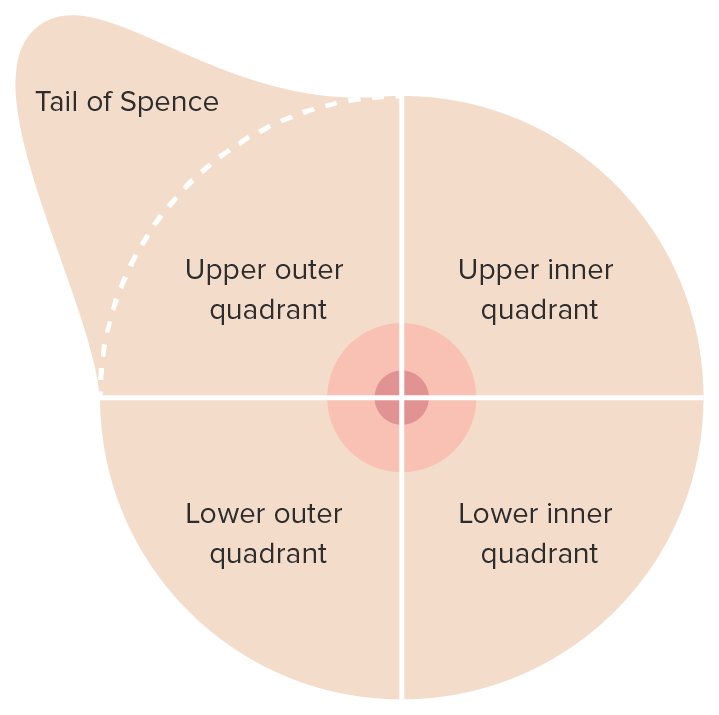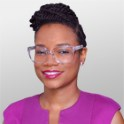Playlist
Show Playlist
Hide Playlist
Breast Cancer Screening in Women
-
Slides Breast and Colorectal Cancer Screening.pdf
-
Download Lecture Overview
00:01 Hello. Now I'd like to review cancer screening in women. 00:06 It's important that you pay attention to this section as this is often tested on the USMLE. 00:11 Let's discuss breast cancer first. 00:16 Who's at risk? 1 in 8 women will have breast cancer in her lifetime. 00:20 The risk of breast cancer increases with age. 00:24 Let's now review the risk profile by age. 00:28 You can see at age 20 the risk is 1 in 1,700 approximately, but as we age into 30s it's 1 in 229. 00:37 1 in 69 for our 40s. 00:40 1 in 42 in our 50s. 00:43 Also, in our 60s the risk becomes in the 20s. 00:48 1 in 29 during our 60s and then in our 70s it sort of stabilizes at 1 in 27. 00:54 Again, the lifetime risk is 1 in 8. 00:58 Let's now review when we start screening. 01:02 What we do and when we do it. 01:05 Different institutions have different guidelines and you should just be aware. 01:09 However, I am an OBGYN so I go by the American College of Obstetricians and Gynecologists or ACOG. 01:17 However, there are guidelines from the American Cancer Society, the ACCN the American Comprehensive Cancer Network, the National Cancer Institute, and the US Preventive Task Force. 01:29 Most of the institutions recommend starting mammography greater than the age of 40, however, you may read that other institutes say 50. 01:37 For the purposes of your exam, I would use the age of 40. 01:41 They all recommend clinical breast examination, however, it's controversial whether or not we should actually recommend breast self examination in the patient to do at home. 01:52 However, most of them do state that the patient should be breast self-aware. 01:57 That means that she should actually look for changes in her breast nipple, also the texture of the breast if there are redness or any lesions that she can actually palpate herself. 02:08 I would now like to address BRCA1 and 2 testing. 02:12 Who and why? So there is a genetic risk assessment that is recommended for women who have a 20-25% chance of an inherited predisposition to ovarian and breast cancer. 02:24 Risk assessment may be helpful for women who have a 5-10% chance of an inherited predisposition of ovarian and breast cancer as well. 02:34 I would now like to bring your attention to BRCA1 and 2 testing, who and why? 1 in 40 women who are of Ashkenazi Jewish descent will be carriers of BRCA1 and 2. 02:46 We do have some special guidelines for women who are BRCA carriers. 02:52 If we know that a woman has BRCA1 or BRCA2 gene mutations, then their guidelines suggest that we should have MRI screening of their breast and this is for women in general who have a 20% or greater lifetime risk of having breast cancer. 03:09 We should also do this in previously untested patients who have a 1st degree relative with BRCA1 or BRCA2 gene mutations. 03:18 We should also do specialized screen in women who've had a history of chest radiation between the ages of 10 and 30 years old. 03:27 Women who have genetic syndromes including Li-Fraumeni syndrome, Cowden syndrome, and other syndromes or patients who have a 1st degree relative with these syndromes should also be tested. 03:39 I would now like to bring your attention to relative risk Relative risk means compared to the general population, these patients with these characteristics have an elevated risk. 03:49 The highest risk category is seen here: If you're greater than age 65. 03:55 If you have BRCA mutations either 1 or 2. 03:59 If you have 2 or more 1st degree relatives with breast cancer diagnosed at an early age i.e. less than the age of 40. 04:07 If you have a personal history of breast cancer. 04:09 If you have a high breast tissue density or if you have a biopsy-confirmed biopsy of atypical hyperplasia, you're at high risk. 04:18 A bit lower risk is having a one 1st degree relative with breast cancer or having had high dose radiation to your chest in the past. 04:28 High bone density in the postmenopause is also associated with breast cancer risk. 04:34 Can you think about why that would be? A high bone density is a good thing to have. 04:39 I'll let you answer that. 04:42 Well, we know patients who have low bone density have low estrogen. 04:47 However, if you have high bone density you probably have a bit higher estrogen and estrogen is what actually potentiates ER positive breast cancer. 04:56 Let's now look at average risk. 04:59 A late age at the first full-term pregnancy actually does put you at risk minimally for breast cancer. 05:06 Women who've had their first pregnancy greater than age 30 have an average increased risk compared to the general population. 05:13 Early menarche actually also puts you at risk. 05:16 Recall, the actual average age of menarche is 12 years old. 05:20 Having it earlier than that can expose your body to estrogen longer than the general population. 05:26 A late menopause greater than 55 years is also a risk factor. 05:32 No full-term pregnancies. 05:33 So woman who's adopted to have her children or she's never been pregnant up to 37 weeks means that she's at increased risk a well. 05:41 We know that women who breastfeed their child have decreased risk of breast cancer so for woman who has never breastfed that is actually an increased risk profile. 05:51 Recent oral contraceptive use is also risk factor and recent long-term use of estrogen and progestin can also put you at risk. 06:00 Obesity can also put you at risk. 06:02 Can you think of why that is? I'll let you think about that. 06:07 Okay, I'll tell you why now. 06:10 Obesity basically means that there are adipocytes that can actually perform peripheral aromatization of androgens into estrogen. 06:18 So these patients have unopposed estrogen exposure putting them at risk for breast cancer. 06:23 There are other factors. 06:25 They're actually linked to breast cancer including endometrial and ovarian cancer, high alcohol consumption and oddly enough, tall height. 06:35 High socioeconomic status is also been linked to breast cancer and of course, patients who are Ashkenazi Jewish heritage are also at increased risk. 06:44 Let's now look at a case. 06:48 Actually, this case may be somewhat familiar to you. 06:51 It's actually me. 06:52 I'm a 36-year-old G1P1001 with menarche at age 10. 06:57 I delivered my first child at age 24. 07:00 I have no family history of breast cancer whatsoever. 07:03 However, my mother is adopted. 07:05 No personal benign history of breast disease and I breastfed for over 1 year. 07:11 Let's now think about that. 07:13 How would you calculate my lifetime breast cancer risk? Hmmm. 07:18 Well, there's an easy tool which you can use. 07:21 You can actually Google this tool and see what comes up. 07:24 The risk calculator actually takes into account the following risk factors: A medical history of breast cancers. 07:32 DCIS or LCIS. 07:35 Mutations in the BRCA gene. 07:37 Current age. 07:39 Age at the first time of her menses or menarche. 07:42 Age at the birth of her fist child. 07:44 Family history of breast cancer and breast biopsies. 07:48 Basically, the results will show you that the 5 year or lifetime risk of breast cancer is based on these risk factors. 07:55 Let's go back to my case now. 07:59 So we've now done the risk assessment and my lifetime risk of breast cancer is 9.8% and in 5 years it's 0.4%. 08:10 When should I start a breast cancer screening? What do you think? Should I start now? The answer is no. 08:26 I would start breast cancer screening in approximately 4 years. 08:30 Let's now talk about another thing. 08:35 Are there anything that you see in my history that would increase my relative risk? Well, I'm not greater than 65. 08:44 I don't have any mutations because I haven't had any risk factors to be tested for BRCA1 or 2, so I don't think I do. 08:52 I don't have any first degree relatives with breast cancer diagnosed at all and I don't have a personal history of cancer. 08:59 I don't think I have high breast tissue density and I've never had a biopsy. 09:03 Let's talk about breast cancer screening. 09:08 So once I initiate breast cancer screening at 40 years old, when should I stop? Well, there are several recommendations, however, there is agreement that women aged 75 years older should in consultation with their physicians, decide whether or not they want to continue mammographic screening. 09:25 Depending on the lifestyle and condition of a patient at 75, they may want to continue or they may elect to stop.
About the Lecture
The lecture Breast Cancer Screening in Women by Lynae Brayboy, MD is from the course Menopause. It contains the following chapters:
- Breast Cancer Screening in Women
- Determining Breast Cancer Risk - Case Study
Included Quiz Questions
The American Cancer Society (ACS) Guidelines for adding MRI screening to a mammogram examination every year is intended for women who have at least what lifetime risk for breast cancer?
- 20%
- 5%
- 10%
- 15%
- 40%
Genetic risk assessment is recommended for women who have what lifetime risk for breast cancer?
- 20-25%
- 2-5%
- 5-10%
- 10-15%
- 30-35%
Which of the following risk factors help in determining a woman's 5-year and lifetime risk for breast cancer?
- Age at birth of first child
- Complete blood count with differential
- Chest X-ray
- Age at the time of her first menses
- Current age
At what age should a woman, in consultation with her physician, consider discontinuing routine mammographic screening?
- 75 years
- 60 years
- 55 years
- 50 years
- 80 years
Which of the following risk factors is NOT used to calculate the lifetime risk of developing breast cancer?
- Age at the most recent mammography
- Mutations in BRCA genes
- Age at the time of her first menses
- DCIS and LCIS
- Age at the birth of her first child
Customer reviews
5,0 of 5 stars
| 5 Stars |
|
5 |
| 4 Stars |
|
0 |
| 3 Stars |
|
0 |
| 2 Stars |
|
0 |
| 1 Star |
|
0 |




